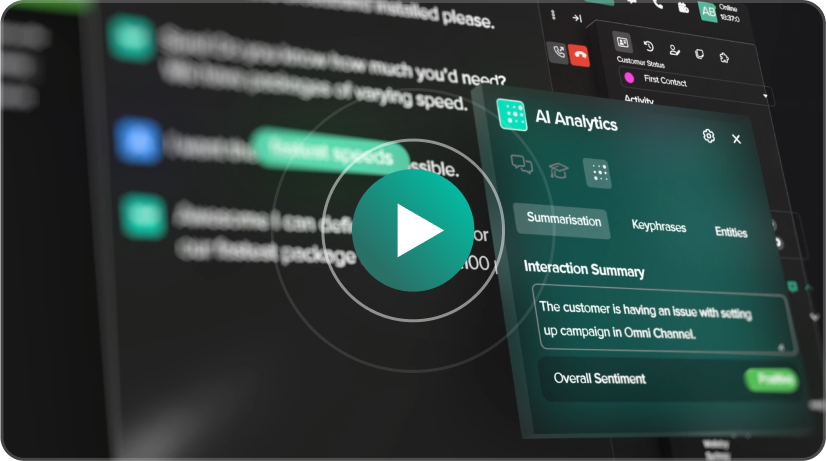Customer Service AI
Customer Service AI has emerged as an invaluable asset for enhancing customer interactions, showcasing Artificial Intelligence’s transformative potential in reshaping business operations across various sectors. Customer Service AI is software or technology that leverages Machine or Deep Learning, NLP (Natural Language Processing), ASR (Automatic Speech Recognition), probabilistic forecasting, or neural networks to perform essential tasks within customer service processes.
AI implementation in the customer service landscape promises to redefine our understanding of how companies relate to customers. However, there are many questions about customer service AI, its nature, its functionality, and future implications for customer service and call centers. How does customer service AI function, and what changes can we expect in the years ahead? Furthermore, what does this evolution mean for human call center agents?
This article aims to address these questions, offering insights into why customer service AI is becoming a driving force in the customer engagement landscape.
What is Customer Service AI?
Customer Service AI refers to software or technology that utilizes advanced techniques such as Machine Learning (ML), Deep Learning (DL), Natural Language Processing (NLP), Automatic Speech Recognition (ASR), probabilistic forecasting, and neural networks. These tools are designed to enhance and streamline various customer service processes by automating tasks, improving response accuracy, and providing personalized interactions. This technology can handle a wide range of functions, from understanding and responding to customer inquiries to predicting customer needs and behaviors, thereby significantly improving the efficiency and effectiveness of customer service operations.
As these technologies evolve, the definition and scope of Customer Service AI undergo continuous transformation. The rapid advancements in Artificial Intelligence contribute to this dynamic nature, with AI in customer engagement continually reaching new milestones and exploring additional potential applications.
The exponential growth of Artificial Intelligence is expected to persist, leading to the introduction of new functionalities in Customer Service AI. A recent survey by Deloitte indicates that a significant 79% of customer service leaders plan to make substantial investments in expanding their AI capabilities over the next two years. This strategic shift underscores the widespread recognition of AI’s potential to revolutionize customer engagement.
The adoption of AI technology presents numerous opportunities for enhancing customer interaction management, with its influence increasingly shaping how businesses engage with their customer base. This surge in AI adoption reflects an industry-wide acknowledgment of the importance of leveraging advanced technologies to optimize customer experiences and maintain competitiveness.
Benefits of Customer Service AI
Enhanced Employee Engagement
AI holds promise in bolstering employee engagement and job satisfaction in customer service. Advanced forecasting capabilities predict call volume fluctuations, aiding proactive agent planning to meet service levels and relieve pressure. Additionally, AI offers insights for issue resolution and efficient upselling, contributing to increased revenue through proven scripts.
Deeper Customer Understanding
AI can be instrumental in enhancing the customer experience. Utilizing features like Natural Language Processing (NLP) and speech analytics, AI records and transcribes customer interactions for easy review. Transcriptions facilitate quick assessments, enabling supervisors to identify coaching areas and capture essential details.
Other AI Analytics tools, such as Keyphrase Analysis and Entity Recognition, enhance contact center analytics, unveiling trends in large customer datasets and providing insights into customer emotions for improved interaction strategies.
AI plays a pivotal role in delivering exceptional customer experiences. It provides timely and personalized information, analyzes conversations at scale for improved first-call resolutions, and facilitates call deflection strategies. Successful call deflection, driven by data collection and analysis, enhances customer satisfaction by enabling quicker and better customer service through alternative channels.
Enable Self-Service and Call Defletion
While AI cannot replace all human agent functions, it excels in resolving simple requests. Routine inquiries fall within AI’s domain, allowing human agents to focus on more complex calls.
AI-driven self-service automation has the potential to handle significant tasks, depending on accurate data availability. Prioritizing data and analytics is crucial for AI to effectively respond to customers and contribute to more extensive self-service capabilities.
Cost Savings
A compelling advantage of Customer Service AI lies in significant cost reduction. Implementing technologies like Conversational AI chatbots automates large volumes of routine queries, enabling staff to concentrate on complex interactions.
Gartner’s study projects that Conversational AI will reduce agent labor costs by $80 billion by 2026. However, while AI brings cost savings, the human touch remains indispensable in customer service, addressing individual concerns and interactions that AI cannot easily replace.
But what are the most important and transformative Customer Service AI features? Let’s go through some of them in the next section.
Customer Service AI Features
Conversational Bots
AI Conversational Bots, commonly referred to as chatbots, represent a departure from traditional chatbots. Unlike their rule-based counterparts, AI Conversational Bots, a type of AI Agent, harness sophisticated machine learning algorithms, such as deep learning and neural networks, to comprehend and generate responses resembling human dialogue. These bots adapt to user behavior, learning from interactions, and excel in grasping context and user intent.
A 2023 study by Gartner revealed that chatbots resolved 52% of customer queries related to orders and purchases, and 48% for returns or cancellations.
Conversational AI, when implemented effectively, emerges as a valuable tool capable of surpassing human agents in responsiveness to routine inquiries. By handling these tasks, it frees up human agents to focus on more complex interactions requiring personal attention or specialized knowledge.
ASR IVR
AI-powered Interactive Voice Response (IVR) systems, integrating Automatic Speech Recognition (ASR) and Natural Language Processing (NLP), interpret customer queries through voice commands, superseding conventional menu-driven IVR systems.
These AI-driven call center IVRs efficiently direct calls, reducing wait times and handling routine inquiries effectively. This automation optimizes operational processes, enabling human agents to dedicate expertise to more intricate interactions, thus enhancing customer satisfaction and loyalty.
In call centers, Sentiment Analysis utilizes speech analytics AI to gauge emotional states by analyzing tone, vocabulary, and speech patterns. Real-time insights into customer sentiment empower contact center managers to improve agent performance through targeted coaching sessions, ultimately contributing to enhanced customer satisfaction and loyalty.
Sentiment Analysis fosters a more empathetic and responsive customer service environment, aligning with the objective of delivering exceptional customer experiences.
Beyond Sentiment Analysis, speech analytics tools offer features such as Keyphrase Analysis and Entity Recognition AI. Keyphrase Analysis tracks frequently used words and phrases, furnishing comprehensive reports for anticipating market trends.
Entity Recognition AI identifies specific entities mentioned during calls, such as company names or products, aiding in data-driven decision-making. These advanced tools efficiently categorize and report instances of entity references during customer service interactions, reducing the time spent on call assessment and routing.
If you enjoyed reading this, you might also be interested in…
Customer Service AI
Conversational AI
Contact Center Artificial Intelligence
Virtual Call Center
AI Based Call Center
Customer Interaction Management
Contact Center Artificial Intelligence
AI Agent

